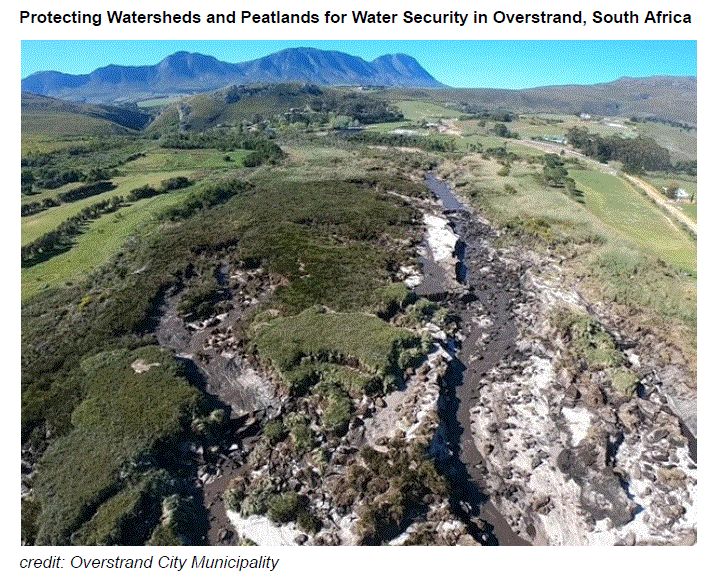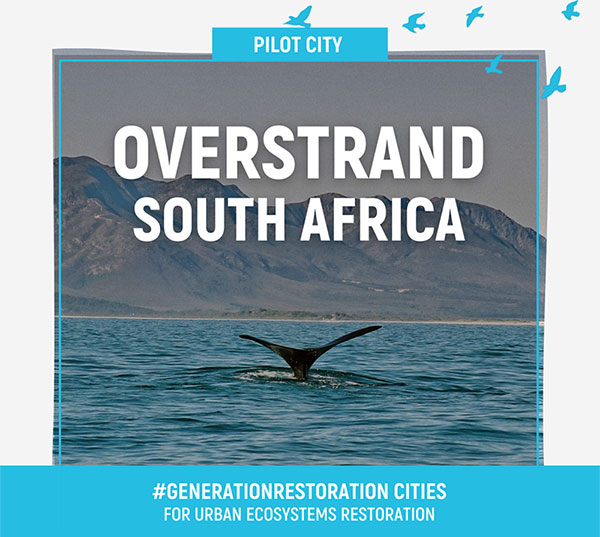The Overstrand municipality alongside with Kisumu, Curitiba, Istanbul, Mendoza and Barranquilla has been announced as the six new pilots for the Generation Restoration project!
Cities occupy only three per cent of the Earth’s land surface, but they are home to more than half its people. As they grow, cities transform the natural world around them and can have devastating impacts on natural ecosystems, if left unchecked. Today, urban areas consume 75 per cent of global resource and energy use, produce more than half of the planet’s waste and at least 60 per cent of its greenhouse gas emissions.
Although they have become hotspots of ecological disruption, cities are also vital hubs of innovation. By virtue of concentration, cities are where solutions can reach millions. Nature and climate action in cities can have a far-reaching impact. To mark World Environment Day, which this year focuses on restoring land, halting desertification and building drought resilience, the United Nations Environment Programme (UNEP) announces six new pilot projects that joined the Generation Restoration Cities cohort of 23 cities. They are in Mendoza in Argentina, Curitiba in Brazil, Barranquilla in Colombia, Kisumu in Kenya, Overstrand in South Africa, Istanbul in Türkiye. The Generation Restoration cities project (2023-25), conceived as a contribution to the UN
Decade on Ecosystem Restoration, the Global Biodiversity Framework and the Paris
Agreement, aim to empower urban stakeholders across the globe to replicate and scale-up ecosystem restoration initiatives through Nature-based Solutions (NbS).
Drought and desertification threaten ecosystems worldwide, including freshwater ecosystems and soil, the connective tissue that makes all life on Earth possible.
Over 40 percent of the world’s land is degraded, affecting half the population and exacerbating extreme temperatures resulting from climate change. However, the six new “Pilot cities” aim to combat this decline. Building Ecological Corridors and Empowering Communities in Mendoza, Argentina
In Overstrand, South Africa, the health of the Onrus River catchment is vital to the well-being of the local population and ecosystems. With peatlands and wetlands facing extensive degradation, the city aims to adopt a holistic approach to watershed management. By rehabilitating the entire catchment corridor, it will safeguard water resources, prevent land Degradation, preserve biodiversity, and mitigate the effects of climate change to ensure the long-term resilience and sustainability of its people and nature. “The Onrus Catchment2Coast River Rehabilitation and Restoration Project launched as part of UNEP’s Generation Restoration project, is part of the Overstrand Municipality’s 2022-2027 Integrated Development Plan, aimed at addressing climate issues. Environmental conservation is crucial as disasters, emergencies, and socio-economic circumstances depend on a functioning natural environment and ecological corridors—the living, green lungs between catchments and coastal systems. It is therefore essential that these activities are adequately funded to prevent natural disasters and consequent socio-economic emergencies”, highlighted Dr. Anelie Rabie, Executive Mayor, Overstrand Municipality, South Africa.



